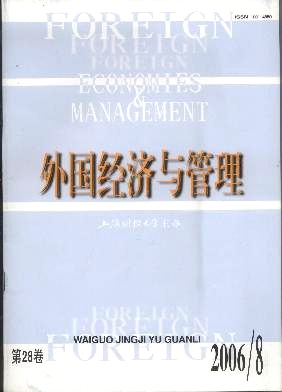西方现金持有理论演进及其经验研究综述
外国经济与管理 2006 年 第 28 卷第 08 期, 页码:56 - 65
摘要
参考文献
[1][英]凯恩斯著;高鸿业译.就业、利息和货币通论[M].北京:商务印书馆,1999:174-186.
[2]Baumol,Williams J.The transactions demand for cash:an inventory theoretic approach[J].Quarterly Journal of Eco-nomics,1952,66:545-556.
[3]Miller,Merton,and Daniel Orr.A model of the demand for money by firms[J].Quarterly Journal of Economics,1966,80:413-435.
[4]Opler,Tim,Lee Pinkowitz,RenéStultz,and Rohan Williamson.The determinants and implications of corporate cashholdings[J].Journal of Financial Economics,1999,52:3-46.
[5]Ferreira,M,and Vilela,A.Why do firm hold cash?evidence from EMU countries[J].European Financial Manage-ment,2004,10:295-319.
[6]Myers,S C,and Majluf,N.Corporate financing and investment and decisions when firms have information that investordo not have[J].Journal of Financial Economics,1984,13:187-221.
[7]Jensen,Michael.Agency costs of free cash flow,corporate finance and takeovers[J].American Economics Review,1986,76:323-329.
[8]Baskin,J.Corporate liquidity in games of monopoly power[J].Review of Economics and Statistics,1987,69:312-319.
[9]Soenen,Luc.Cash holding:a mixed blessing?[J].Corporate Finance,2003,(Sep./Oct.):55-57.
[10]Dittmar,Amy,Jan Mahrt-Smith,and Henri Servaes.International corporate governance and corporate liquidity[J].Journal of Financial and Quantitative Analysis,2003,38:111-133.
[11]Pinkowitz,L,and Williamson,R.Bank power and cash holdings:evidence from Japan[J].Review of Financial Study,2001,14:1059-1082.
[12]Hartzell,Jay C,Sheridan Titman,and Garry Twite.Why do firms hold so much cash?a tax-based explanation[R].Working Paper,the University of Texas at Austin,2005.
[13]Mulligan,C B.Scale economies,the value of time,and the demand for money:longitudinal evidence from firms[J].Journal of Political Economy,1997,105:1061-1079.
[14]John,T A.Accounting measures of corporate liquidity,leverage,and costs of financial distress[J].Financial Manage-ment,1993,22:91-100.
[15]Harford,J.Corporate cash reserves and acquisitions[R].Unpublished Working Paper,University of Oregon,Eugene,1998.
[16]Ozkan,Aydin,and Neslihan Ozkan.Corporate cash holdings:an empirical investigation of UK companies[J].Journalof Banking&Finance,2004,28:2103-2134.
[17]Mikkelson,Wayne H,and M Megan Partch.Do persistent large cash reserves hinder performance?[J].Journal of Fi-nancial and Quantitative Analysis,2003,38(2):275-295.
[18]Baum,C,M Caglayan,and N Ozkan.The impact of microeconomics uncertainty on cash holdings for non-financialfirms[R].Working Paper,Boston College,2005.
[19]Haushalter,David,Sandy Klasa,and William F Maxwell.The influence of product market dynamics on the firm’s cashholdings and hedging behavior[R].Working Paper,the Pennsylvania State University,2005.
[2]Baumol,Williams J.The transactions demand for cash:an inventory theoretic approach[J].Quarterly Journal of Eco-nomics,1952,66:545-556.
[3]Miller,Merton,and Daniel Orr.A model of the demand for money by firms[J].Quarterly Journal of Economics,1966,80:413-435.
[4]Opler,Tim,Lee Pinkowitz,RenéStultz,and Rohan Williamson.The determinants and implications of corporate cashholdings[J].Journal of Financial Economics,1999,52:3-46.
[5]Ferreira,M,and Vilela,A.Why do firm hold cash?evidence from EMU countries[J].European Financial Manage-ment,2004,10:295-319.
[6]Myers,S C,and Majluf,N.Corporate financing and investment and decisions when firms have information that investordo not have[J].Journal of Financial Economics,1984,13:187-221.
[7]Jensen,Michael.Agency costs of free cash flow,corporate finance and takeovers[J].American Economics Review,1986,76:323-329.
[8]Baskin,J.Corporate liquidity in games of monopoly power[J].Review of Economics and Statistics,1987,69:312-319.
[9]Soenen,Luc.Cash holding:a mixed blessing?[J].Corporate Finance,2003,(Sep./Oct.):55-57.
[10]Dittmar,Amy,Jan Mahrt-Smith,and Henri Servaes.International corporate governance and corporate liquidity[J].Journal of Financial and Quantitative Analysis,2003,38:111-133.
[11]Pinkowitz,L,and Williamson,R.Bank power and cash holdings:evidence from Japan[J].Review of Financial Study,2001,14:1059-1082.
[12]Hartzell,Jay C,Sheridan Titman,and Garry Twite.Why do firms hold so much cash?a tax-based explanation[R].Working Paper,the University of Texas at Austin,2005.
[13]Mulligan,C B.Scale economies,the value of time,and the demand for money:longitudinal evidence from firms[J].Journal of Political Economy,1997,105:1061-1079.
[14]John,T A.Accounting measures of corporate liquidity,leverage,and costs of financial distress[J].Financial Manage-ment,1993,22:91-100.
[15]Harford,J.Corporate cash reserves and acquisitions[R].Unpublished Working Paper,University of Oregon,Eugene,1998.
[16]Ozkan,Aydin,and Neslihan Ozkan.Corporate cash holdings:an empirical investigation of UK companies[J].Journalof Banking&Finance,2004,28:2103-2134.
[17]Mikkelson,Wayne H,and M Megan Partch.Do persistent large cash reserves hinder performance?[J].Journal of Fi-nancial and Quantitative Analysis,2003,38(2):275-295.
[18]Baum,C,M Caglayan,and N Ozkan.The impact of microeconomics uncertainty on cash holdings for non-financialfirms[R].Working Paper,Boston College,2005.
[19]Haushalter,David,Sandy Klasa,and William F Maxwell.The influence of product market dynamics on the firm’s cashholdings and hedging behavior[R].Working Paper,the Pennsylvania State University,2005.
引用本文
毕重林, 朱国泓. 西方现金持有理论演进及其经验研究综述[J]. 外国经济与管理, 2006, 28(8): 56–65.
导出参考文献,格式为:
上一篇:主观工作幸福感研究述评
下一篇:目标管理理论述评





 7225
7225  0
0

